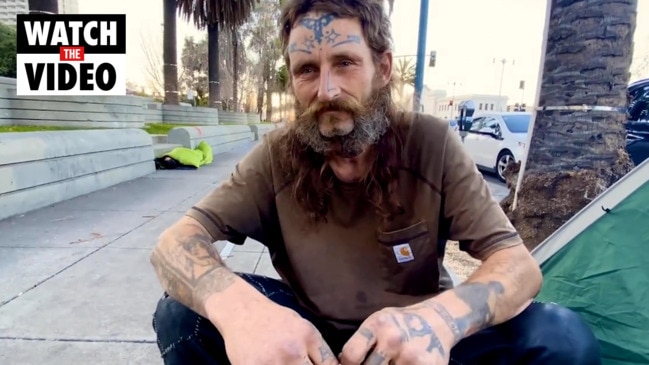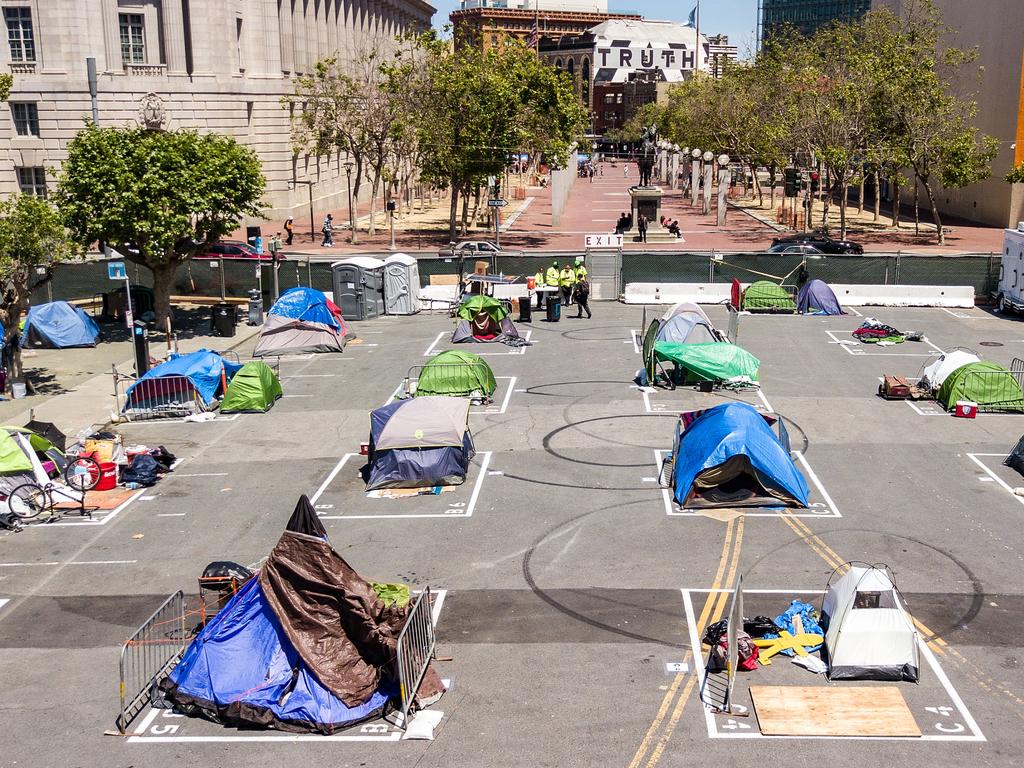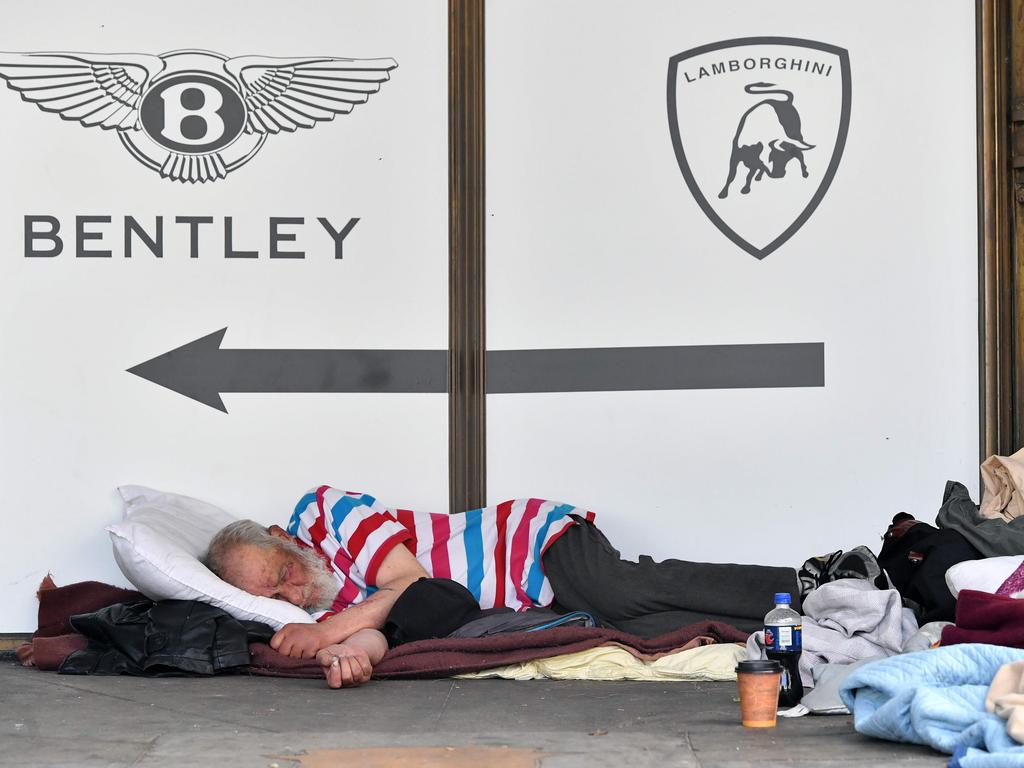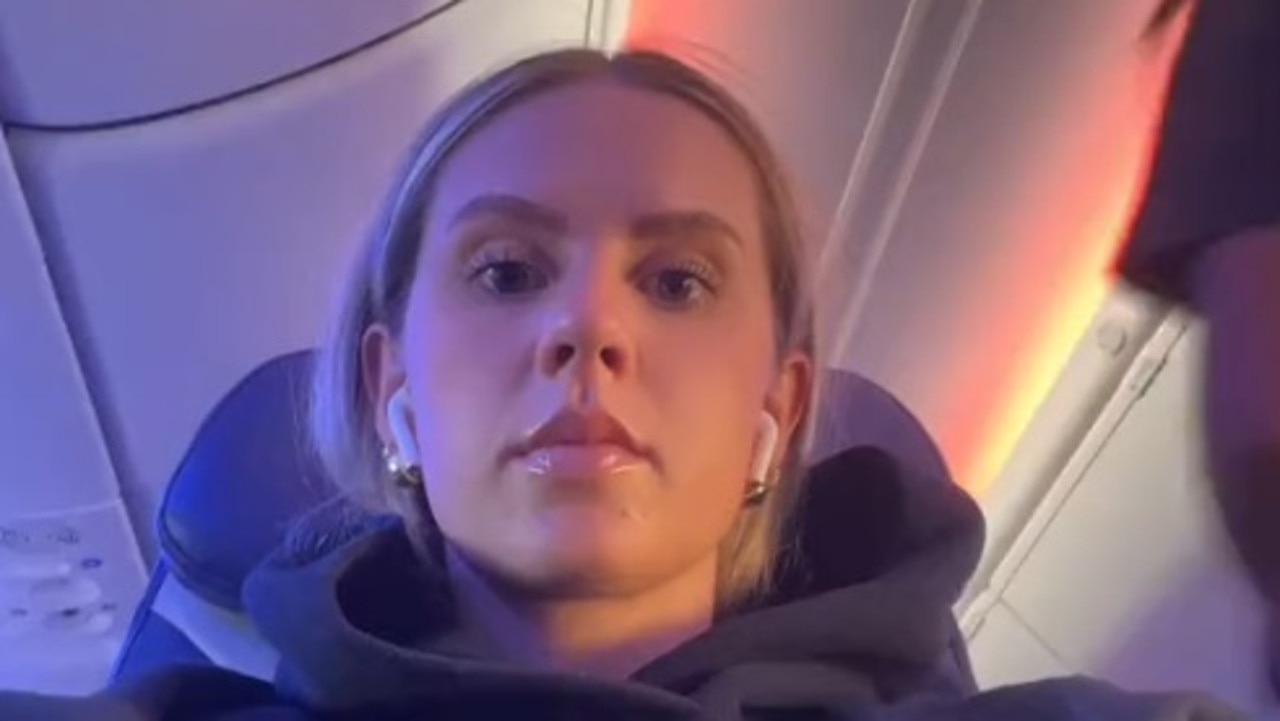San Francisco drug addict says ‘they pay you to be homeless here’
A homeless drug addict has given a viral interview explaining the shocking reason he chooses to live on the streets.

A homeless drug addict has given a candid interview explaining that he chooses to live on the streets of San Francisco because he’s paid $US820 ($1140) a month in welfare and food stamps.
“If you’re going to be homeless, it’s pretty f**kin’ easy here,” the man named James tells journalist Michael Shellenberger in a viral clip posted to Twitter, which has been viewed more than 240,000 times.
“I mean if we’re going to be realistic they pay you to be homeless here. I mean, I get 620 bucks a month, dude.”
Asked if it was hard to get, he replies, “F**kin’ phone call. A f**kin’ phone call, bro. Two hundred food stamps and 620 bucks cash a month. Forget about it. Why wouldn’t I do it? You know, it’s f**kin’ free money.”
He adds that his living situation “is literally by choice”. “Why would I want to pay rent? I’m not doing s**t,” he says. “I’ve a f***ing cellphone that I have Amazon Prime and Netflix on.”
People say lack of housing forces local residents into the streets, but James says he came from Texas to San Francisco for the drugs, the non-enforcement of anti-camping laws, and the $820/month in welfare & food stamps. James says he sold fentanyl, 2 weeks ago, to a 15-year-old. pic.twitter.com/5qMr6tmlWs
— Michael Shellenberger (@ShellenbergerMD) February 9, 2022
James, who says he came to San Francisco from Texas for the drugs and the lax enforcement of anti-camping laws, recounts selling fentanyl to two teenagers looking to buy prescription painkiller OxyContin.
According to the Centers for Disease Control and Prevention, a record 100,000 Americans died from drug overdoses in the first 12 months of the Covid-19 pandemic, with nearly two-thirds attributed to synthetic opioids such as fentanyl, which is typically produced in China and trafficked across the border from Mexico.
“I set it down in front of them and said, ‘This is a gram of fentanyl. This is enough to kill six people that have never used it. What I do to get high is this much’, and I showed them how much I do,” James tells Shellenberger in the clip.
In another interview, a man named Ben says he regularly “boosts”, or shoplifts, and breaks into cars to pay for his $US60-a-day heroin habit.
“The majority of homeless people, drugs is integral if not the main reason why you’re out here,” he says.
People say high rent causes homelessness but Ben, who has been homeless in San Francisco for 7 years, says the “vast majority†are homeless due to addiction. Just 6-7% are from SF. Ben says he "boosts" (shoplifts) and breaks into cars to pay for his $60/day heroin habit. pic.twitter.com/uewKTtBuOS
— Michael Shellenberger (@ShellenbergerMD) February 6, 2022
Shellenberger, the author of San Fransicko, an investigation into the causes of San Francisco’s homelessness crisis, filmed the interviews last week in the downtown Tenderloin District, at the city’s new “Linkage Center”.
The centre is intended to connect homeless people and drug addicts with basic services like food and showers, but has become a scene of rampant drug dealing and use.
Shellenberger was evicted from the centre, which is off-limits to the media, last Thursday after entering without authorisation, The San Francisco Chronicle reported.
A spokesperson for the city’s Department of Emergency Management said a person climbed over the fence and was later escorted off the premises by staff.
“I was in the Linkage Center monitoring it as is my right as a citizen,” he told the newspaper. “I was covering a secret and illegal medical experiment. I was evicted from the site.”

It comes less than two months after Mayor London Breed announced an emergency declaration in the Tenderloin, and vowed to crack down on crime and drug use there.
“It’s time that the reign of criminals who are destroying our city to comes to an end,” Ms Breed said at a December 14 news conference. “And it comes to an end when we take the steps to be more aggressive with law enforcement … and less tolerant of all the bullsh*t that has destroyed our city.”
San Francisco has been gripped by a sharp rise in crime, including brazen acts of mass shoplifting that go unpunished and have resulted in some outlets, including pharmacy chain Walgreens, permanently closing a number of stores.
In December, San Francisco residents began taking drastic measures to avoid having their car windows smashed.
Some were reportedly leaving their windows rolled down and doors unlocked, while photos showed others even leaving their boots open.
With Bay Area car break-ins on the rise, people are going to great lengths to avoid having their windows smashed... Even leaving their trunks open. https://t.co/173cPjuzNvpic.twitter.com/mjGoigNMsa
— ABC7 News (@abc7newsbayarea) December 15, 2021
The city’s long-running homelessness crisis has also made it synonymous with public defecation.
In 2018, San Francisco officially commissioned a “Poop Patrol” dedicated to removing street faeces.
SFGate reported in July last year that things may be turning a corner, with reports of street faeces down from a record 16,547 in the first half of 2020.
In San Fransicko, Shellenberger pins the blame for the homelessness, drug and crime epidemics – seen in cities across the US including San Francisco, Los Angeles, Seattle and Portland – on progressive Democratic leadership at the city and state level.
“How and why do progressives ruin cities?” he asks.
The book argues that “the underlying problem isn’t a lack of housing or money for social programs” but “an ideology that designates some people, by identity or experience, as victims entitled to destructive behaviours”.
The controversial author, whose previous books focused on climate change and environmentalism, has won praise from some quarters for the book while others have been critical of his conclusions.
Columnist Tim Stanley from the UK’s Telegraph gave the book five stars, describing it as a “must-read expose of the misery caused by an ultraliberal policy experiment”.
“The Golden City, where the hippies wore flowers in their hair, spends 6 per cent of its annual budget on the homeless, including $US31,985 ($A44,600) per head on housing alone,” he writes.
“Yet while homelessness declined nationally from 2005 to 2020, here it almost doubled, to 8124.”

Shellenberger suggests the real problem is the refusal to crack down on drugs.
“San Francisco has effectively gone down the route of decriminalisation, and become a safe space for addicts and pushers,” Stanley writes.
“Shellenberger concludes that at the heart of much of this is a perverse cult of victimhood, reflected in the very language we use. The word ‘homeless’ is passive.
“It implies that the individual is the victim of a social problem beyond their control, i.e. the unfair distribution of property. So long as policymakers believe this, they fail to grasp the complex psychological factors that keep people from making better choices.”
Wes Enzinna from The New York Times, however, argued Shellenberger “isn’t really interested in having a nuanced debate about failed policies”.
“He wants to redefine homelessness as a problem caused not by poverty or lack of housing but as one caused by addiction, mental illness and ‘disaffiliation’, by which he means ‘choice’,” Enzinna writes.
“Claiming that the homeless choose to live on the streets is an old conservative cliche, but Shellenberger injects it with new life by blaming the ‘pathological altruism’ of woke progressive culture.”
But Enzinna claimed the facts “don’t support his argument”.
“According to experts, as many as 30-40 per cent of San Francisco’s unhoused may suffer from some form of mental illness, but addiction and mental illness are often the result of homelessness, or are greatly exacerbated by the stress of living on the streets, not its root cause,” he writes.
“What is ultimately so troubling about San Fransicko isn’t just how much the book gets wrong – it’s the way Shellenberger distorts facts to turn homelessness into a new front of the culture wars.”






